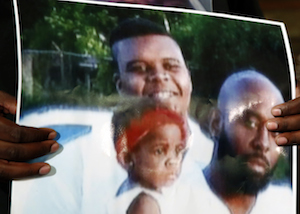Ferguson marks 3 weeks since 18-year-old killed
Sunday, August 31, 2014
FERGUSON, Mo. -- A few hundred people again gathered in Ferguson on Saturday afternoon to remember Michael Brown, the unarmed, black 18-year-old who was shot and killed by a white police officer three weeks ago that day, and draw attention to what they say is just the beginning of a national discourse about police tactics and race.
Led by Brown's parents and other relatives, Saturday's throng peacefully made its way down Canfield Drive in the St. Louis suburb to a makeshift memorial that marked the spot where Brown was shot Aug. 9 by Ferguson police officer Darren Wilson.
"We know that his life is not going to be in vain," the Rev. Spencer Booker of St. Louis' St. Paul A.M.E. Church said, standing in the middle of the street which was covered with candles, placards, stuffed animals and now-wilted flowers. "We know you're going to even the score, God. We know you're going to make the wrong right."
Brown's mother, Lesley McSpadden, and father, Michael Brown Sr., encircled the memorial with other family members during prayers, including one by a Muslim clergy member.
Activists at the rally called for mass civil disobedience, with organizers telling demonstrators to drive on Interstate 70 and other area highways at 4:30 p.m. Monday, turn their hazard lights on and stop their vehicles for 4½ minutes to symbolize the 4½ hours that Brown's body lay in the middle of a Ferguson street after being fatally shot.
"We're going to tie it down, going to lock it down," Anthony Shahid, one of the lead organizers of the rally, told supporters from the stage at a Ferguson park. "I want the highways shut down. I know it's a holiday, but it won't be no good holiday."
Hours after the rally, hundreds of protesters again gathered in front of the suburban Police Department and fire station, blocking the road. Fiery speeches gave way to another march, with chants of, "If we can't have it, we're shutting it down."
Some lobbed angry insults at a line of Ferguson officers and state police who stood guard at a taped-off section of the city parking lot, but the number of protesters dwindled to double digits by late afternoon.
Wilson, a six-year police veteran, has not been charged. A St. Louis County grand jury is considering evidence in the case, and federal investigators are sorting out whether Brown's civil rights were violated.
There was a muted police presence Saturday during the march, which began on a stretch of West Florissant Avenue that became the nexus of nightly protests -- some contentious and violent -- and looting in the days after Brown's death.
"They've already seen the whole world look at the missteps that they made, how they handled the black community like an army going to war in Iraq," said Akbar Muhammad, an organizer of the demonstration and a top aide to Louis Farrakhan, leader of the Nation of Islam, a group that helped organize the march.
Meanwhile, unmistakable signs of healing are beginning to dot Ferguson.
Businesses along a stretch of West Florissant Avenue that were victimized by looting are replacing boarded-up windows with signs out front reading, "Open For Business." People who have been too scared to take their kids out of their homes are milling about once again. A barbecue joint that was nearly torn apart hasn't been fully repaired, but an outdoor grill fills the air with a tantalizing smoky aroma.
"Look at those signs over there," Missouri State Highway Patrol Capt. Ron Johnson said, pointing out homes with "I Love Ferguson" signs in their front yards. "A few days ago those signs would have been ripped up or thrown in a trash can or painted on. And they stand today.
"That is definitely symbolic of marching down the road toward solutions and a better tomorrow."
Jerryl Christmas, a St. Louis attorney who helped lead Saturday's march and others in the past, agreed that change is only just beginning.
"We're just three weeks into this, and this is only the beginning of this movement," he said. He's intent on keeping Brown and the resulting turmoil and questions "in the forefront of America."
"We want the president to come here. He remarked that he didn't have a strategy for ISIS and Syria, but we need a strategy for urban America," Christmas said, using an acronym for the Islamic State. "The tragedy is this could have happened anywhere."
Information for this article was contibuted by Manny Fernandez and Campbell Robertson of The New York Times and by Jim Salter of The Associated Press.
A Section on 08/31/2014
